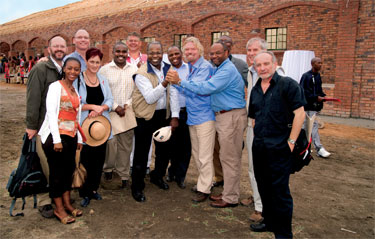|
During 2006, some 111,000 employees based in southern Africa participated in our HIV and AIDS programmes. We estimate that 21%, or approximately 23,500 of these employees, are HIV-positive.

In the past, we have reported on all the divisions and business units which participate in our HIV and AIDS programmes but, with restructuring of the Group’s interests, AngloGold Ashanti, Mondi Paper and Packaging, Exxaro and various smaller operations will not be included in future reports (see scope of this report ).
We remain concerned about the emerging HIV/AIDS epidemics in eastern Europe, India and China. We are also trying to re-energise our AIDS response in South America, where the increasing feminisation of HIV and AIDS is a worrying issue.
The central aim of our workplace HIV and AIDS response is to achieve the correct balance between prevention, care, support and treatment. In order to achieve continual improvement, clear and measurable indicators are essential. Many HIV/AIDS programmes focus on processes, such as education, awareness, counselling and condom distribution, but we find it is more productive to focus on outcomes. Deciding on key performance indicators and then setting targets are crucial to effective action.
The company has three ambitious overall targets for its HIV/AIDS programme:
- Zero new HIV infections
- Zero employees and family members becoming sick or dying from AIDS
- Zero babies born HIV-positive in employees’ families.
We believe that today we have the tools to achieve these targets and if they can be reached, we will actually STOP AIDS. We emphasise constantly that these targets must be achieved within a framework that allows zero tolerance of discrimination, stigmatisation or any breach of human rights.
HIV testing is the cornerstone of Anglo American’s AIDS response and is the entry point for both prevention and care. It is critically important for all people to know their HIV status and, more importantly, to check their status on a regular basis. Early diagnosis of HIV infection gives the best prospects for proper care, support and correctly timed access to treatment. We encourage all employees to have an HIV test on an annual basis. The actual testing is always voluntary, supported by compulsory counselling.
We strive to make testing easily accessible in a confidential, trusting and professionally supportive atmosphere.
We set targets for HIV testing, measure performance and strive for continual improvement. Each year, we start again from zero. Results in 2006 were particularly pleasing, with a dramatic improvement in uptake of
HIV testing as reflected in the table below. Through this concerted HIV testing campaign, we have managed to enrol 11,600 employees on our HIV disease management programmes. We estimate, therefore, that we have reached 49% of HIV- positive employees in order to provide care, support and treatment where necessary.
| Group uptake of HIV testing |
Employees |
| 2003 |
< 10% |
| 2004 |
21% |
| 2005 |
31% |
| 2006 |
63% |
| Click here for a more detailed look at the data tables |
Some business units have achieved exceptional results. Anglo Coal, with 8,200 employees, achieved 82% VCT uptake in 2006. Because they repeat this good performance on an annual basis, they are now in a position to measure the incidence of new HIV infections each year. During 2006, there were 80 new HIV infections in employees who had previously tested negative. This is far off the zero mark but there is now much stronger focus on prevention, with a general understanding among the workforce that much more has to be done to reach the zero target. Furthermore, compared with national averages, Anglo Coal believes that an equal number of HIV infections were averted during the course of the year. Prevention is working, albeit not well enough.
![Group trends in costs of ART provision [chart]](images/charts/page45.gif)
Most people know that ART is a lifesaving intervention, but it is not widely appreciated that early access to ART is particularly important for preventing illness, especially tuberculosis, in HIV-positive individuals. If treatment is started too late, it is more complicated, less successful and more expensive. Our strong VCT programme helps our medical staff to diagnose HIV infection sooner. Through regular monitoring, we can ensure that employees are started on ART before they get sick. We have clear evidence that early access to treatment leads to a striking reduction in absenteeism, with economic benefits that cover a large portion of the cost of ART.
At the end of 2006, we had 4,600 employees on ART: 95% of these people are well, carrying out their normal work and leading normal lives. We estimate that we have reached 65% of the HIV-positive employees who are in need
of treatment.
Our greatest challenge is to ensure strict adherence to treatment and to support employees in their lifelong treatment programme.
![Short-term trends in absenteeism [chart]](images/charts/page46.gif)
One-third of those who have started ART have dropped out for various reasons. About 7.6% have died, 10.5% were non-adherent to treatment and 8.4% left employment. Deaths are mostly due to treatment being started too late or due to non-adherence. We strive to ensure that individuals leaving our employment continue their treatment in other treatment programmes.
Ensuring that dependents have the same access to HIV and AIDS care as employees is an ongoing challenge. Access to comprehensive AIDS care, including ART, for the entire family is available as a prescribed minimum benefit for those employees who choose to participate in health insurance arrangements (co-funded by the company and the employee). However, the majority of employees choose to rely on the national health system for the health care of their families. Although ART is available in this setting, waiting times are long and service provision is patchy. We are investigating ways to encourage many more employees and their families to participate in health insurance arrangements.
Economics
Since Anglo American started providing ART in late 2002, we have been evaluating intensively the economic costs and benefits of the intervention. It takes several years to accumulate reliable economic data, but we are now reaching a stage where we can confidently state that the medium-term costs of providing ART to employees are significantly outweighed by the savings in terms of reduced absenteeism and reduced healthcare costs (where directly provided by the employer). Increased productivity, retention of skilled employees and improved morale are further positive consequences of the programme. It is likely that these benefits will increase in the short to medium term as costs come down, and more people accessing a more effective programme means health outcomes improve. The Anglo American experience has shown that private sector action on HIV/AIDS can have positive impacts on health and profits. In high-prevalence settings, it is inaction that poses the greatest threat to business.
The Anglo American Community HIV/AIDS Partnership Programme (CHAPP) was launched in 2003. Its aim was to rapidly scale up Anglo American’s involvement in community HIV/AIDS initiatives in South Africa and to build platforms for new projects.
The first priority is youth. Preventing teenage pregnancy and sexually transmitted infections is an important part of the effort to stop HIV infection in the communities in which we work. Therefore, we provide support to individuals and organisations working to prevent HIV in young people.
Anglo American’s CHAPP works in communities around eight of the company’s operations in six provinces. Its first major NGO partner was loveLife, a youth HIV prevention and skills development programme. Through the Anglo American Chairman’s Fund, Anglo American has given loveLife R30 million ($4.5 million) over a period of four years.
Strong leadership is probably the single most important indicator of an effective response to the AIDS epidemic. This applies equally to
government, businesses, trade unions and NGOs. Leadership starts from the top and in our experience it is imperative that the chairman, the CEO and the business unit managers get involved personally. This has certainly been the case at Anglo American and we believe that it shows in the success of our AIDS response.
Anglo Coal is part of a public/private partnership to build a community health centre in the rural Bushbuckridge area of South Africa. The partnership includes the US government, Virgin Unite – Virgin group’s charitable arm – and the Ndlovu medical centre.
The Bhubezi community health centre aims to tackle the effect of HIV/AIDS and the devastating impacts of tuberculosis and malaria.
Services will be offered free of charge for people suffering from these diseases and treatment for other illnesses will be subsidised through cost-sharing schemes with patients.
The R50 million ($7.4 million) project – launched in October 2006 – will provide X-ray equipment, pharmacy and laboratory services, and bring doctors to the community. It will serve approximately 70,000 people living in 21 villages in Bushbuckridge. In addition to providing health services, the centre will contribute to local economic development.
Anglo Coal has donated
R5 million ($0.74 million) for infrastructure development and a similar amount will be donated over the next five years towards management support. With many employees in the Bushbuckridge area, the company will share experience from its own HIV/AIDS programme which was commended in the 2006 Awards for Business Excellence from the Global Business Coalition for HIV/AIDS, Tuberculosis and Malaria.
Anglo Platinum is sponsoring a ground-breaking trial that has contributed to a 55% drop in domestic rape – a key factor in HIV transmission – among a group of poor women in South Africa’s Limpopo province.

Ben Magara, CEO Anglo Coal South Africa, centre left, Sir Richard Branson, fourth from right, Eric Bost, US ambassador, third from right, celebrating the construction of the Bhubezi community health centre at Bushbuckridge, which has been made possible through a public/private partnership.
The trial provides a group of 850 rural women with business loans to become economically self-sufficient, and offers gender and HIV education to help them negotiate sexual relationships better and challenge negative attitudes within the community.
Two years into the three-year trial, results show the women’s economic well-being and selfconfidence have improved. They also have more influence over household decisions and feel more able to challenge traditional gender norms. Their experience of physical or sexual violence in the past year was halved compared with women from nearby villages who did not take part in the trial.
|